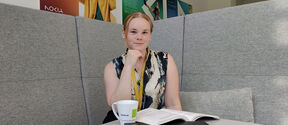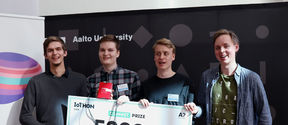Hitesh Monga shaped his path in Aalto from a summer intern to a master’s graduate
Hitesh Monga, graduate from Communication Engineering master's major, shares the path that lead him to Aalto and beyond

In this webinar, the programme representatives introduce Aalto University, give a programme overview, explain the programme structure and content, discuss career opportunities, and answer questions from the audience.

The world comprises networks that connect people and devices and are a prerequisite for all other technologies to work successfully. Developing, building, and maintaining networks is crucial for our future as new technologies keep emerging, and ICT technology is one of the key enablers of sustainable development. For example, by connecting autonomous vehicles together and allowing them to share data, emissions can be reduced as traffic becomes smoother and more efficient.
Thanks to the large number of chip manufacturers, mobile network vendors, and network operators, Finland offers the perfect, rare ecosystem for engineering modern networks. Here, you get to actually design and build future solutions that will be used by millions.
The Communications Engineering major is part of the Master’s Programme in Computer, Communication, and Information Sciences (CCIS). The major prepares students to respond to the global need for modern and better networks. It consists of a strong technological core surrounded by human-centric understanding of user needs and behaviour.
Upon graduating from the Communications engineering major, you have:
● Excellent knowledge of technology fundamentals. Graduates are experts in the fields of networked systems and wireless communications.
● In-depth programming skills. Graduates possess exceptional skills in programming and can work in demanding fields like machine learning and network protocols.
● Practical experience in the field. During their studies, students work closely with the industry. Upon graduation, they have both practical know-how and good connections to leading companies.
● Solid understanding of human-centric computing and communications. The graduates know what makes communications technology usable and how to improve user experience.
● Capability to shape the world. Graduates have the necessary knowledge and tools to influence technological advancements and the future.
In the Communications Engineering major, the language of instruction is English.
The tuition fee for this programme is 17 000 euros per academic year. Citizens of European Union (EU), the European Economic Area (EEA) or Switzerland do not pay tuition fees. Citizens of other countries must pay tuition fees.
Aalto University offers a small number of scholarships in the form of tuition fee waivers to fee-paying students. Scholarships can be awarded to the highest-achieving applicants based on the programme's evaluation criteria. Applicants are ranked according to the criteria outlined on the programme's webpage.
More information on tuition fees and scholarships at Aalto University is available at the Scholarships and Tuition Fees webpage.
Two-year studies in the Communications Engineering major comprise a total of 120 ECTS credits:
● Major studies (60 ECTS)
● Elective studies (30 ECTS)
● Master’s thesis (30 ECTS)
All the compulsory and optional major courses are intended to be completed during the first year. The second year is dedicated to elective studies and the Master’s thesis. You can choose practically any combination of elective courses – from Aalto as well as other universities in Finland and abroad – that supports your studies and suits your interests. Aalto University Learning Services offer students help in planning their studies.
More information on the programme content and curriculum can be found in the Student guide.
Teaching methods
In this major, teaching methods consist mainly of lectures, individual and group projects as well as hands-on experiments. Aalto University has its own Aalto nextG infrastructure that supports research on the development of future mobile networks – especially when it comes to advanced radio communication systems and Internet technologies for 5th generation mobile communication systems and beyond. This infrastructure allows students to experiment with, for example, a 5G test network.

Hitesh Monga, graduate from Communication Engineering master's major, shares the path that lead him to Aalto and beyond

Niki Aarnio has especially liked the internationality and concrete nature of his studies

Project supervisor Alexis Dowhuszko thinks that the project covered all the phases needed to create a start-up
Depending on their interests and aspirations, students can choose to deepen their understanding on networked systems, wireless communications, or ubiquitous computing.
In the area of networked systems, students learn to design data networks, cloud systems, IoT systems, and services for large enterprises and operators (fixed and mobile) while taking efficiency, scalability, security, and reliability into account. They learn to virtualize networks and manage them on cloud systems, reducing operational costs and easing remote management. A further central topic is environmentally sustainable ICT: how we can build more sustainable digital services, networks, and cloud platforms.
Expertise in wireless communications is developed by studies in modern wireless communication system architectures, fundamentals of communications theory, signal processing, as well as resource and spectrum management. Students learn to understand and develop new technologies for radio access networks beyond 5G.
In the direction of ubiquitous computing, students can learn about key information technologies and operation strategies needed for humans to access data ubiquitously while being mobile. They also get to focus on the utilisation of various sensor and artificial intelligence techniques to make the everyday environment sensitive to user needs.
Courses at Aalto give an excellent basis for understanding and developing advanced and sustainable networking and cloud technologies for 5G mobile networks and beyond, data centres, and e-commerce – impacting both private and public sectors. The main objective is to give our students the ability to empower the society with innovative mobile services, and help Finland retain its competitive edge in the field of mobile communication systems.
The learning environment in this major – and the entire Aalto University – is strongly international, and studies are conducted in multicultural groups. The School of Electrical Engineering offers diverse possibilities for student exchange all over the world. Exchange studies can be easily included in the degree e.g. as an international minor.
Communications Engineering students also have the opportunity to take their second-year studies at UPC Barcelona Tech in Spain, or Grenoble INP in France and complete a double degree graduating from both Aalto University and one of the two partner universities.
Other possibilities for developing one’s global competence include conducting practical training or the Master’s thesis abroad, taking a summer course abroad, acting as a tutor for first-year students, or learning foreign languages.
The degree programme provides eligibility for scientific postgraduate studies in Finland. The skills learned in the programme create an excellent basis for doctoral studies at Aalto University, another Finnish university or top international universities. Doctoral graduates from Aalto University continue to researcher or other academic career or high-level business positions, among other things. Read more about applying for doctoral studies at Aalto University: https://www.aalto.fi/en/doctoral-education/how-to-apply-for-doctoral-studies
In the digitalised world, communications engineering expertise has an ever-growing importance – almost all our students are already in the working life upon graduation. They work not only at ICT companies, but also at companies from various industries that apply ICT in their operations. Some of the employers are:
● Telecommunications equipment vendors
● Chip manufacturers and radio modem developers
● Network operators
● Large corporations and governmental organisations
The demand for communications engineering experts is high especially in Finland and the other Nordic countries. In this area, there is a strong ICT industry consisting of a large cluster of equipment and infrastructure vendors as well as mobile network operators. In Finland, the biggest employer is Nokia that designs, for example, next generation communications systems.
Aalto University and the Communications Engineering major work closely with the industry, guaranteeing excellent employment opportunities. Students’ career paths usually start in the form of an internship, industry project work, or a Master’s thesis written for a company. The most successful students are offered the possibility to work in a research group during their studies.

In her master's thesis, made in collaboration with Nokia, Riina Kostiainen researched dividing 5G networks into virtual slices, which ensure bandwidth for such critical devices.

Bhavya Omkarappa thinks courses in Aalto University are very effective in simulating real working life scenarios

Graduates from the School of Electrical Engineering at Aalto University have very good employment prospects in positions corresponding to their education. On this page, you can find information about employment and career development five years after graduation.
The Department of Information and Communications Engineering combines different research fields from ICT technology to core electrical engineering. Research is carried out in close cooperation with industry. The research areas include:
● Human-centric technology. This area focuses on technology that boosts human capabilities and assists people in their daily activities. Topics studied include, for instance, ambient intelligence, human-computer interaction (HCI), and mobile cloud computing.
● Communications and networked systems. In this research area, the goal is to develop and validate overall systems so that the research results can be eventually deployed to real systems. The research groups working in this area cover all protocol stack levels, including ground-breaking work on physical layer, media access, and Internet scale technologies. The area takes particular pride in that we also deploy and develop hardware and software implementations.
● Fundamentals of information and communications engineering. This research area contributes to the specifications of several generations of wireless communication systems. The topics of interest vary from wireless and mobile communications and signal processing to information and communication theory.
You can read more about the research at the Department of Information and Communications Engineering here.
Aalto University is well-known for bridging different disciplines – students may choose their elective study modules so that their degree is a combination of science, technology, business, and arts. They can supplement their studies with courses from other Aalto schools and programmes as well as courses offered by other universities, including international. This multidisciplinary environment sparks new ideas, friendships, networks, and every so often, startups.
The Communications Engineering major also has deep industry-academia relationships both in research and teaching. For example, some of the courses have guest lecturers from companies and almost all of the Master’s theses are written at a company.

The department of Information and Communications Engineering has a strong focus in the ICT area varying from ICT technology to core electrical engineering and its basic phenomena.

The new high-speed mobile network will give students, researchers and companies new opportunities to test and develop future technologies.

Students and developers all over Europe took part in the 48-hour hackathon

Curious about life at Aalto University? Chat with Aalto students and join them for virtual Coffee sessions every Friday!
Applicants to the programme must meet the general eligibility and language requirements that are common to all Master's programmes in Aalto University. Applicants meeting Aalto’s general eligibility criteria for master's studies are evaluated and ranked according to the evaluation criteria decided in advance for each study option.
The applications to major Communications Engineering, Master’s Programme in Computer, Communication and Information Sciences (CCIS) are evaluated based on the following criteria.
This English-version is the master version of the CCIS programme-specific evaluation criteria, and its Finnish and Swedish versions are its translations.
| What is evaluated? | Grades of the previous degree(s) and pace of studies |
| What we look for in an applicant |
The CCIS programme is looking for applicants with excellent academic performance in their previous studies. In study options where the number and quality of applications is high, this means that the applicant has achieved consistently excellent grades throughout the degree studies (very high weighted average grade or GPA). The applicant’s prior academic performance will be evaluated based on the grade point average (GPA) and grades in key courses. The time spent on the previous studies will also be considered. All the applicant’s previous university studies, including incomplete degrees and non‐degree studies, will be taken into consideration when evaluating academic performance. Applicants from Finnish universities of applied sciences (AMK) |
| Method of demonstrating competence | Transcript(s) of records, degree certificate(s) |
| What is evaluated? | Contents and scope of previous studies |
| What we look for in an applicant |
Applicants are expected to have a high-quality Bachelor’s degree in computer science, software engineering, communications engineering, or electrical engineering. Excellent candidates with degrees in other fields including but not limited to information systems, engineering, natural sciences, mathematics, or physics will be considered if they have sufficient studies in the required areas. The required university-level studies, as well as subjects that are considered an advantage, are defined below for major Communications Engineering: Required university-level studies:
Studies in at least some of the following subjects are considered an advantage:
The contents of the applicant’s previous degree(s) are evaluated based on the courses on the official transcript of records. Relevant work experience, professional certificates and online courses can also be taken into account in the evaluation, but they do not in general compensate for the absence of university-level studies covering the theoretical foundations of the knowledge areas. |
| Method of demonstrating competence | Transcript(s) of records, course descriptions |
| What is evaluated? | Recognition and quality of the applicant's previous institution |
| What we look for in an applicant | We expect applicants to have completed their previous degree in a high-quality university and programme. The recognition of the applicant’s home university also affects the interpretation of the grades when evaluating the academic performance. |
| Method of demonstrating competence | International and national rankings of higher education institutions |
| What is evaluated? | Applicant’s suitability to the study option, motivation, commitment to the studies, and written communication skills |
| What we look for in an applicant |
The applicant should be motivated to study the chosen subject and committed to full‐time studies with a plan to complete the Master’s degree in two years. We are looking for applicants who can express clearly the reasons for applying to the study option and describe why they would be excellent candidates for it. Studies in the Master’s programme should provide genuinely new knowledge for the applicant. If the applicant already has a Master’s or a higher degree or is studying towards one, the motivation letter should clearly indicate why another one is necessary. In most cases, non-degree studies are recommended instead. |
| Method of demonstrating competence | Application as a whole including motivation letter |
| What is evaluated? | Work experience, other qualifications and achievements |
| What we look for in an applicant |
Beyond their academic record, applicants may have other experience, knowledge and qualifications that prepare them for the Master’s studies and distinguish them among their peers. We particularly value demanding work experience related to the planned studies, participation in scientific research leading to publications, entrepreneurship, and special achievements such as success in competitions (e.g. Junction Hackathon). |
| Method of demonstrating competence | Curriculum vitae, recommendation letters, proofs of employment, publications, other certificates, GRE or GMAT results (if available). |
The evaluation process is described under Applicant evaluation process. In addition to obligatory application documents, this study option asks the applicants to submit also the documents listed under Requested documents.
During the evaluation of eligible applicants, applications are first evaluated based on the following criteria:
Only the applications who fulfil the requirements for these criteria will be evaluated against the full set of evaluation criteria. It is not possible to compensate for these criteria with other criteria.
After the evaluation of the remaining criteria below, the best applicants will be selected based on the joint evaluation of all criteria.
The admission process is very competitive and only the best applicants are selected yearly. Not all applicants fulfilling the requirements can be admitted.
Applications missing any of the required study-option specific documents i.e. motivation letter and curriculum vitae, are rejected, and not evaluated against any of the evaluation criteria.
The documents requested from all applicants are listed here (https://www.aalto.fi/en/study-at-aalto/applying-to-masters-programmes). In addition, applicants to this study-option are requested to provide the following study-option-specific documents:
*) The lack of this document will cause rejection.
In addition, these additional documents add value to your application:
All additional application documents described above should preferably be submitted in English. If some other language than English, Finnish or Swedish is used in them, the applicant must provide precise, word-for-word translations of them.
Upload the documents to your online application form in pdf-format. Name the file(s) according to format: Name of the document-Lastname-Firstname (e.g. CV-Lastname-Firstname.pdf). Maximum file size is 1.0 GB.
The study-option-specific documents must be uploaded for each study option separately, even if you use the same document (e.g. CV). Please check carefully the study-option-specific document requirements for each study option you apply to.
The deadline for the study-option-specific application documents to be uploaded to your application form is the same as for the general application documents.
Aalto University Admission Services
If you have any questions regarding the application process, application documents or language tests, please contact Aalto University Admission Services
admissions@aalto.fi
School of Electrical Engineering
For enquiries regarding the content of programme, the studies at the School of Electrical Engineering and the study-option specific application documents please contact
masters-elec@aalto.fi